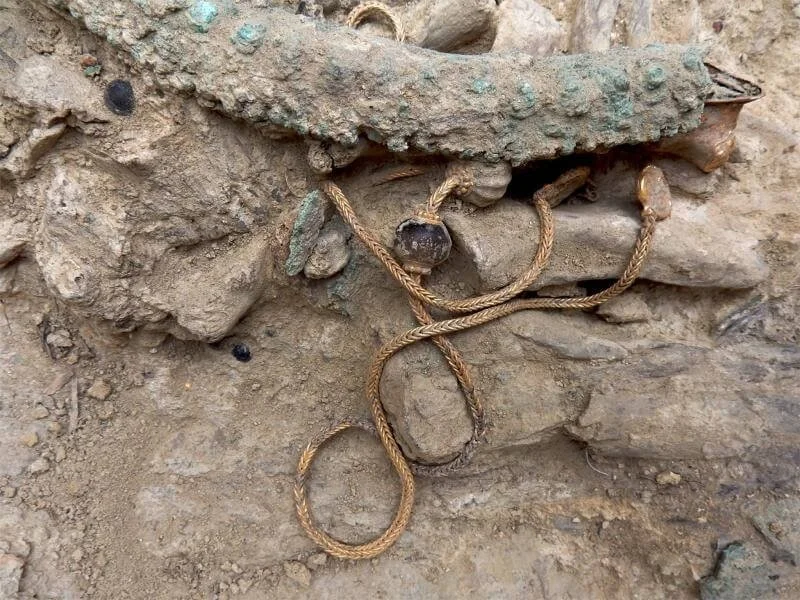It was understood that the structure unearthed during the ongoing excavations in the 8850-year-old Ulucak Mound (Ulucak Höyük), the oldest settlement of Izmir in the west of Turkey, is the oldest ceramic production workshop. Fingerprints of pottery masters who lived in the city 8000 years ago were also discovered on the dough used to make ceramics.
Prof. Dr. Ozlem Cevik, the excavation’s director, stated that the workshop is very important as it physically demonstrates the first specialization in ceramic production.
Ulucak Höyük is located in the Kemalpaşa district of İzmir. Trakya University Faculty of Letters Protohistory and Near Eastern Archaeology Faculty Member of the Department Professor Dr. Özlem Çevik took over the excavation directorship in 2009, and the work carried out on the mound continues.
Prof. Dr. Özlem Çevik. Photo: DHA
During the excavations, it was discovered that Ulucak Mound was home to the Aegean Region’s first farmers. It was also understood that the first settlers built their homes on top of each other along the 7.5-meter cultural layer and settled in the same place for 1150 years without interruption.
A 7800-year-old female figurine was found on the mound recently days, which was used to increase abundance and fertility.
One of the oldest settlements of Western Anatolia Ulucak Mound, ceramic production workshop, and the findings provided access to much new information.
It was noted that in the 100 square meters structure, which is thought to be the oldest ceramic production workshop in history, there are kilns in which ceramic pots were fired and many ground stones were used to grind hematite paint in the painting of ceramic pots.
Photo: DHA
Prof. Dr. Ozlem Cevik, the head of the excavation, said, “Historically, we know that the first ceramics were made 9 thousand years ago in a wide geography from Mesopotamia to the Aegean Region. When these first ceramics were made, they were probably produced by women in the household. A thousand years after the emergence of the first ceramics, it was assumed that these were made by pottery masters, based on the examinations made on the ceramics found in this wide geography that I mentioned. This workshop we found in Ulucak is important for the near east or world archeology. Because for the first time, there is physical proof that ceramics were made by experts.”
Specialization in Ceramic Production
Professor Özlem Cevik informing about the workshop: “This structure is very different from houses. A place with 6-7 rooms. All stages of ceramic production are applied in these areas. n other words, the entire chain of ceramic production takes place, from the preparation of the dough to its shaping, from the use of the primer to the finishing. We can easily say that this is a ceramic production workshop. According to the analysis of the seed samples, we know from the radiocarbon datings that the structure was dated to 6 thousand BC, so this is an 8,000-year-old workshop. The workshop is very important as it physically demonstrates the first specialization in ceramic production in the history of humanity. This workshop is the oldest evidence of specialization in ceramic production” she said.
8000 years old fingerprints found in Ulucak Mound. Photo: DHA
Adding that fingerprints were found in the finds in the workshop, Cevik said, “Clay dough must be prepared before making ceramics. Workshop burned. In the dough we found, we saw that the fingerprints on it were solidified. The fingerprints and hands of people who touched it 8,000 years ago are thus preserved.”
Excavations at Ulucak Höyük continue with the support of the Turkey Ministry of Culture and Tourism, İzmir Metropolitan Municipality, Kemalpaşa Municipality, and Kemalpaşa Organized Industrial Zone.










